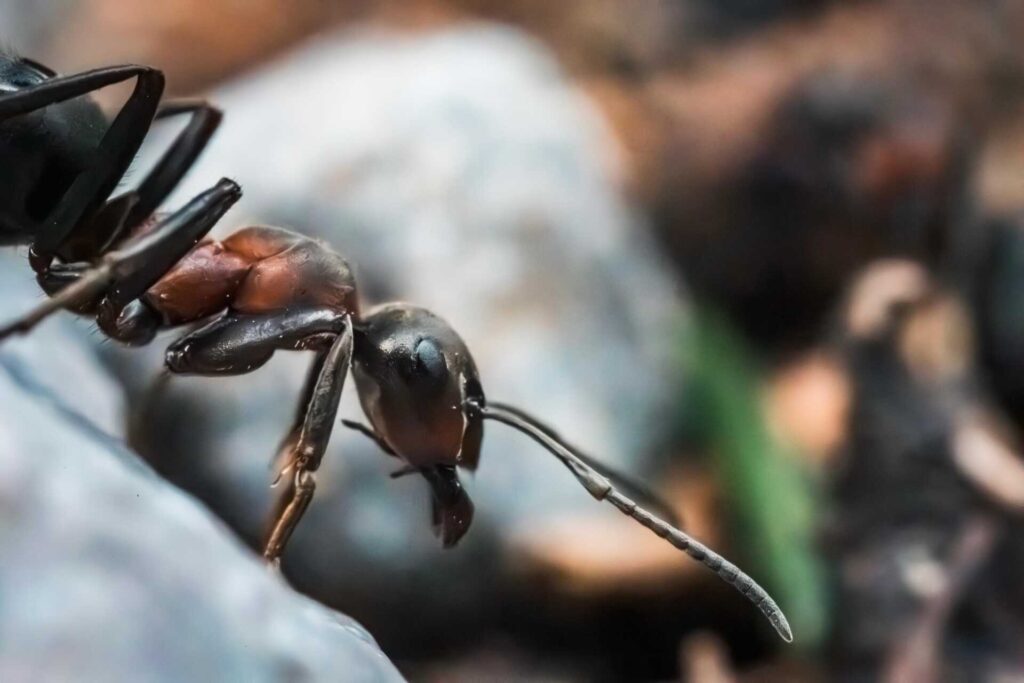
Contents
When ant invaders march into your West Michigan abode, it’s time to put your eco-friendly armor on and battle them with nature’s arsenal. Discover how a few household items and natural remedies can help you bid farewell to these six-legged intruders without harsh chemicals. From simple vinegar solutions to aromatic essential oils, your kitchen might just hold the key to reclaiming your space. Explore these five tips and equip yourself with the tools for a greener ant extermination journey in West Michigan.
Key Takeaways
- Use vinegar to disrupt ant trails and deter entry.
- Create DIY traps with sugar and borax along ant paths.
- Employ essential oils like peppermint or tea tree for control.
- Consider diatomaceous earth to dehydrate and repel ants.
- Follow safety precautions when using borax ant bait.
Natural Ant Repellents
When dealing with ant infestations, natural ant repellents can be a practical and eco-friendly solution. Understanding ant behavior is essential in effectively repelling them from your home. Ants communicate through pheromones, leaving trails for other ants to follow to food sources. By disrupting these trails, you can deter ants from entering your living spaces.
Eco-friendly pesticides like diatomaceous earth or vinegar can be used to create barriers that ants are reluctant to cross. Diatomaceous earth is a natural mineral dust that’s lethal to ants but safe for humans and pets. When ants walk over diatomaceous earth, they absorb the oils and fats from their exoskeleton, leading to dehydration and death. Sprinkle a thin layer of diatomaceous earth along entry points to create a protective barrier against ants.
Vinegar, a common household item, can also be effective in repelling ants. The strong scent of vinegar disrupts ant pheromone trails, confusing them and deterring them from entering your home. Mix equal parts of vinegar and water in a spray bottle and apply it to areas where ants are present.
DIY Ant Traps
To effectively combat ant infestations in your home, DIY ant traps can be a cost-effective and practical solution. Understanding ant behavior is essential when setting up homemade traps. Ants are social insects that leave scent trails to communicate with each other, leading them to food sources and potential nesting sites. By disrupting these trails with DIY ant traps, you can effectively control their movement and reduce their presence in your living spaces.
Homemade ant traps can be made using common household items such as sugar, borax, and water. Mixing sugar and borax in a 1:1 ratio creates a potent bait that attracts ants. The sugar lures them in, while the borax acts as a slow-acting poison that they carry back to their colony, effectively eliminating the entire population over time. Placing these traps strategically along ant trails or near entry points can maximize their effectiveness.
It’s important to note that DIY ant traps may take some time to show visible results, as it can take a while for the poison to spread through the colony. Be patient and resist the urge to disturb the traps, allowing the ants to carry the bait back to their nest consistently.
Regularly replenishing the bait in the traps ensures a steady supply for the ants to transport, accelerating the extermination process. By utilizing homemade traps tailored to ant behavior, you can effectively manage ant infestations while minimizing environmental impact.
Vinegar Solution for Ants
An effective and eco-friendly solution for deterring ants from invading your living spaces is a vinegar solution. Vinegar, a common household item, offers several benefits when it comes to ant control. The strong smell of vinegar disrupts the scent trails that ants use to navigate, effectively deterring them from entering your home.
To create a vinegar mixture for ant control, combine equal parts of water and vinegar in a spray bottle. This mixture can be sprayed along entry points, such as windowsills, doorways, and baseboards, to create a barrier that ants will avoid.
Additionally, you can use this solution to wipe down countertops, floors, and other surfaces to eliminate any ant pheromones that may attract more ants.
Vinegar is a natural and non-toxic alternative to chemical ant repellents, making it safe for both humans and pets. It’s also cost-effective and readily available in most households.
Regularly using a vinegar solution for ant control can help prevent future infestations and keep your living spaces ant-free in an eco-friendly manner.
Incorporating vinegar into your pest control routine helps deter ants and aligns with environmentally conscious practices. Consider utilizing vinegar mixtures as a natural and efficient way to combat ant invasions while minimizing your impact on the environment.
Essential Oils for Ant Control
Using essential oils for ant control has been a popular and effective method for many homeowners seeking natural solutions to pest problems. Essential oils are derived from plants and possess properties that can deter ants due to their strong scents and chemical composition.
When used correctly, essential oils can disrupt ant behavior and prevent them from entering your living spaces. Here are three essential oil blends that have shown promise in controlling ant infestations:
Peppermint Oil: Peppermint oil is known for its invigorating scent, but to ants, it’s a powerful repellent. The strong aroma interferes with the ants’ ability to communicate and navigate, disrupting their pheromone trails. This makes it challenging for them to forage for food effectively.
Tea Tree Oil: Tea tree oil has antimicrobial and insecticidal properties that can be effective in repelling ants. It interferes with their neurotransmitter function, causing confusion and disorientation among the ant population. This disrupts their normal behavior patterns and discourages them from entering your home.
Lavender Oil: Lavender oil has a pleasant aroma for humans but is overwhelming for ants. It disrupts their sense of smell, making it difficult for them to locate food sources. Additionally, lavender oil has calming effects on ants, which can deter them from invading your living spaces.
Borax Ant Bait
Borax ant bait is a commonly used method for effectively eliminating ant infestations in homes. Borax, also known as sodium borate, is a natural mineral compound that’s often used in household cleaning products and pest control solutions.
When used as an ant bait, borax works by interfering with the ants’ digestive systems, ultimately leading to their demise.
The effectiveness of borax as an ant bait lies in its slow-acting nature. Ants are attracted to the sweet substance mixed with borax, which they carry back to their colonies. As the ants consume the bait and share it with other members of the colony, the borax gradually disrupts their ability to digest food, leading to their eventual death.
When using borax ant bait, it’s important to do so with caution, especially if there are pets or small children in the household. While borax is considered a relatively safe pest control option when used properly, it should be placed in areas that are inaccessible to pets and children to prevent accidental ingestion.
Additionally, following the instructions on the product label to ensure the safe and effective use of borax for ant extermination is essential.
Recap
Utilizing natural ant repellents, DIY ant traps, vinegar solutions, essential oils, and borax ant bait are effective eco-friendly methods for ant extermination in West Michigan. By implementing these strategies, you can safely and efficiently rid your home of ants without the need for harmful chemicals. Remember to consistently apply these techniques to maintain a pest-free environment and protect your living space.
Recent Posts
Eco-Friendly Termite Treatment Options for Homes
Did you know that traditional termite treatments can harm the environment just as much as
Top Eco-Friendly Mosquito Control Services Nearby
If you’re tired of battling mosquitoes but want to keep your outdoor space safe and
Find Local Eco-Friendly Mosquito Control Solutions
Imagine a world where your backyard isn’t a battleground against pesky mosquitoes. Finding local eco-friendly
